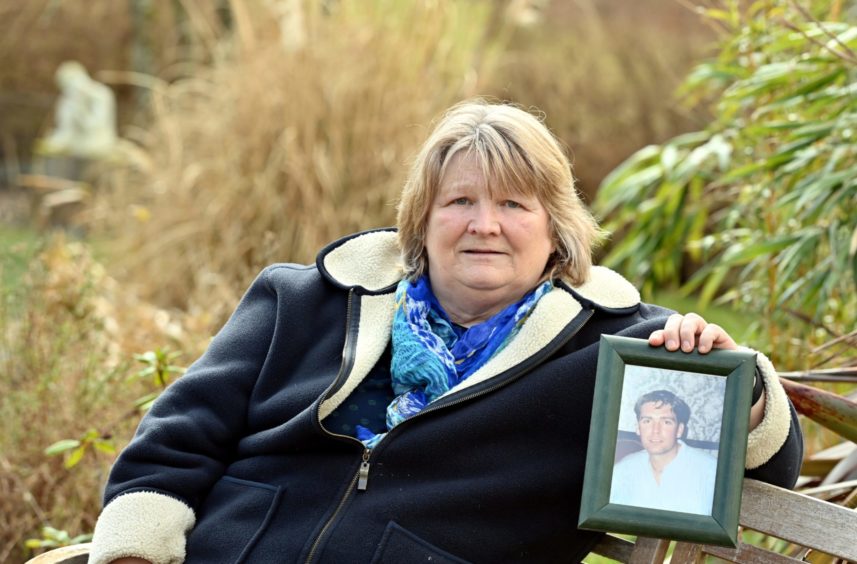Holyrood could overhaul the prisoner release system after an Aberdeen dad was fatally stabbed 40 times by a mentally ill criminal.
Alan Geddes, 56, was killed in his own home after the Good Samaritan gave Stuart Quinn, then 35 years old, a place to stay following his recent release from jail.
Quinn, who had a history of alcohol and drug-induced psychotic episodes, had been “unexpectedly” liberated from prison and was freed without any support package or accommodation in place.
Less than 24 hours after his release, Quinn brutally attacked Mr Geddes with a lock-knife at his Ruthrieston Crescent flat on December 7 2019.
The killer was sentenced by the High Court in Glasgow to a minimum of 18 years in prison in February 2021.
Potential new law
Now, north-east MSP Douglas Lumsden is urging lawmakers to support his proposal to create a post-custody outreach service for offenders who have been released from jail.
The initiative has already been recommended by the Mental Welfare Commission, which investigated events leading up to Mr Geddes’ murder.
A report published by the Commission last month revealed that Quinn, who was “recognised to pose a risk of violence”, had been hospitalised four times in the 18 months before the frenzied fatal attack.
On three of those occasions when he was transported to the psychiatric facility he was found in possession of a potential weapon, the report said.
And it added that “the lack of accommodation” provided for Quinn on his unexpected release is “likely to have impacted on the outcome” of the tragic incident.
The probe concluded that “if (Quinn) had been offered accommodation in December 2019 this is likely to have reduced the risk to (Alan Geddes) who invited him to his home because of his lack of accommodation”.
Mr Lumsden, a Conservative politician, hopes to appear before the Scottish Parliament’s Criminal Justice Committee as early as next week.
He plans to present an amendment to the Bail and Release from Custody (Scotland) Bill and urge the committee of MSPs to incorporate it into the potential new law.
The proposed new legislation focuses on reserving remand for offenders who pose a risk to public safety.
It would also do more to rehabilitate and reintegrate people leaving prison to help them resettle in their communities, according to the Scottish Government.
The changes, which are designed to improve public protection measures, could lead to the publication of new national standards of support given to people leaving prison.
Post-custody outreach service
Mr Lumsden told The Press and Journal: “In setting up a post-custody outreach service, Scottish Ministers would be required to consult with Community Justice Scotland, each local authority and each health board.
“My amendment goes on to commit to providing a point of contact for every person released from custody who has at some point spent time detained in hospital.
“Clearly a person who has been detained in hospital at some point requires additional support, compared to other offenders, given the mental health problems that person has encountered, and so it is vital that there is someone in place to proactively outreach to them.”
Mr Lumsden’s initiative has the full support of Alan Geddes’ 66-year-old sister Sandra, who told the Press and Journal: “It’s extremely important that this amendment is taken seriously.
‘There’s no follow-through. It’s ludicrous’
“The Mental Welfare Commission for Scotland did an incredible investigation into my brother’s murder.
“I certainly hope that the Scottish Parliament will take it as seriously as the Commission did.
“I’m aghast that there’s not enough support for prisoners who can go to court and be released and nobody intervenes to ask them where they’re going and what support they’ve got.
“There’s no follow-through. They’re just let out, knowing that they’re going to commit other crimes. It’s ludicrous.”
The Crown Office and Procurator Fiscal Service (COPFS) examined the circumstances of Quinn’s release from HMP Grampian.
It followed a claim that the homeless unit the released prisoner should have checked into was closed.
But the COPFS’ Scottish Fatalities Investigation Unit (SFIU) found “no record” of him turning up to any of Aberdeenshire or Aberdeen City councils’ 24/7 accommodation units.
It emerged that, despite opportunities available to him, he took a bus to Aberdeen and “instead of arranging for accommodation, Stuart Quinn had spent some of his money on alcohol and controlled substances”.
Investigators said they found “no causal link” between any form of psychosis or mental illness and the criminal actions of Quinn.
No Fatal Accident Inquiry to be held
The SFIU concluded that “the principal reason” for the father-of-one’s violent death was Quinn’s “own actions whilst under the influence of cocaine and alcohol”.
And it was also revealed that Quinn was assessed two days before his release from prison and “no psychotic symptoms were identified”.
The SFIU’s findings led to the Crown Office’s decision not to launch a Fatal Accident Inquiry into the tragedy.
But a letter that explained the decision to the Geddes family also stated: “Had it been the case that a mentally disturbed prisoner was released without support then a significant public interest issue would arise”.
A COPFS spokesman, who would not comment on ongoing civil proceedings, said that officials had received a request to reconsider an FAI.
He said: “The Mental Welfare Commission report’s finding is being fully considered as part of the review of the decision not to hold a Fatal Accident Inquiry into the circumstances surrounding the death of Alan Geddes.
“The review is being conducted by independent Crown Counsel with no previous involvement in the matter.
“The family will be advised of the decision following the review.”
In December last year, the day before the third anniversary of Alan Geddes’ murder, his sister raised court action against the Crown Office, the Scottish Prison Service and NHS Grampian.
She intends to “strongly pursue” legal action if the COPFS doesn’t give in to her demand for an inquiry.
“We need to have an FAI so people can be held accountable for the decisions they make in their jobs,” Ms Geddes said.
“The Crown Office took three months to do their investigation which contradicted the findings of the Mental Welfare Commission’s report.
“I want to know what information the judge had in front of him on the day that he released Quinn. I can’t get that.”
The Scottish Prison Service and Aberdeen City Council said they were either unable to or would not comment on the case.
A spokesman for NHS Grampian said: “We cannot comment on ongoing legal proceedings.”
For all the latest court cases in Aberdeen as well as crime and breaking incidents, join our Facebook group.




